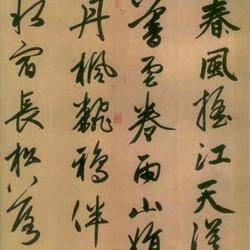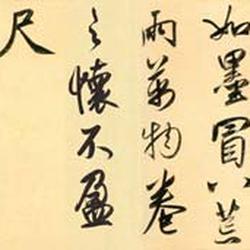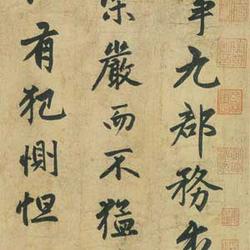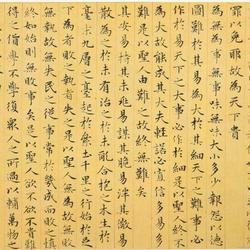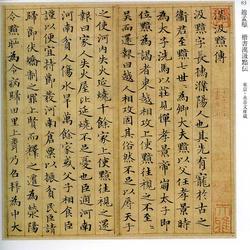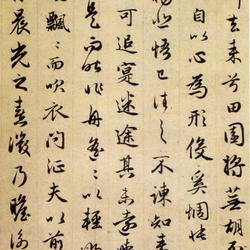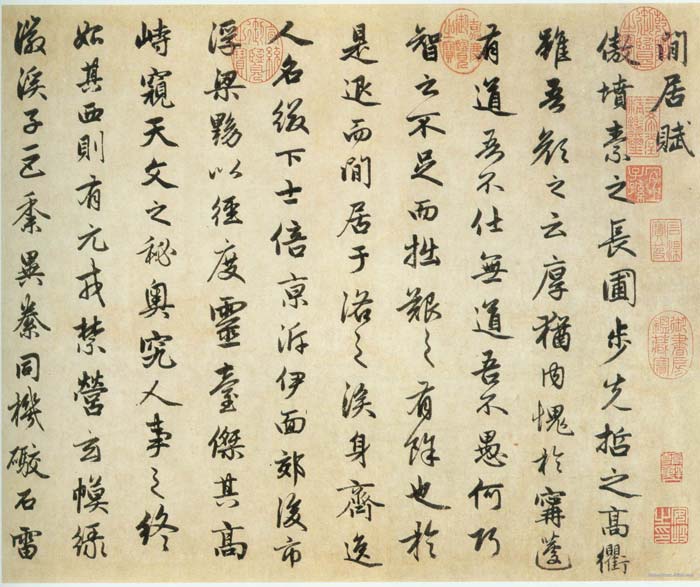
Part of "Xianju Fu" by Zhao Mengfu, collected by the National Palace Museum in Taipei
"Xianju Fu" is 38 cm long and 248.3 cm wide. It is a poem called "Xianju Fu" written by Pan Yue, a famous writer in the Western Jin Dynasty. It has 56 lines and 627 words, and the inscription is Ziang.
"Xianju Fu" was written by Pan Yue, a writer in the Western Jin Dynasty. The predecessors seemed to have some criticisms. For example, Yuan Haowen, a famous poet of the Jin Dynasty, said in "On Thirty Poems": "The paintings in the heart and the voice in the heart are always distorted. Is it better to see the person again in the article?" "Xianju Fu", a high sentiment through the ages, strives to trust Anren and pay homage to Lu Chen. Judging from historical records, Yuan Haowen's discussion of the relationship between the author and the work is relatively objective.
Similar to Pan Yue's situation, Zhao Mengfu is also one of the historical figures who caused great controversy in later generations. He himself has been wandering between the two poles of officialdom and seclusion. In addition, he is an official as the grandson of an old prince, so his psychological consequences can be imagined. Throughout his life, he could not help but worry about advancing and retreating. Zhao Mengfu's feeling of guilt and shame was really an objective existence that was difficult to dismiss and would accompany him throughout his life. When he wrote "Xianju Fu", he actually hoped to use the power of calligraphy to reconcile or alleviate his inner conflicts and uneasiness in a certain way, so that his mind could gain a moment of tranquility. The writing style of this work is leisurely, the charm is fresh, the whole text is a combination of regular script, both square and round, and the posture is elegant. It also reflects the bookish and noble spirit of Zhao's calligraphy art.
This work has no year date, but judging from the calligraphy, it should be written in his later years, and it is Zhao Mengfu's best work. At the end of the volume there is an inscription and postscript by Cao Rong of the Qing Dynasty.
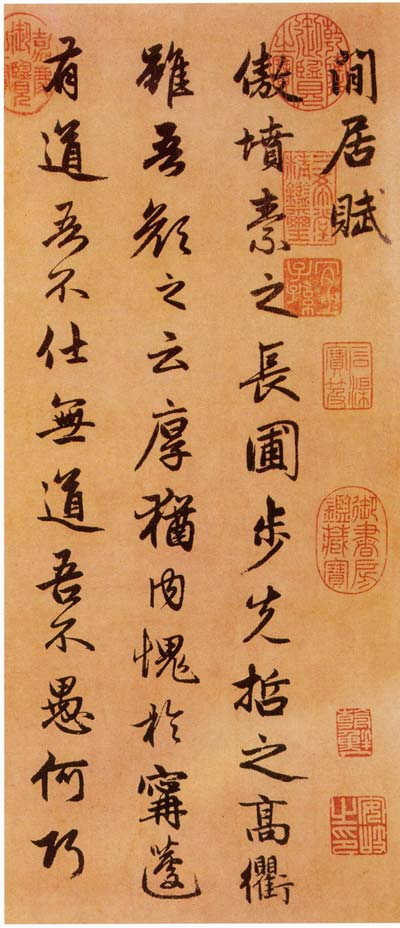
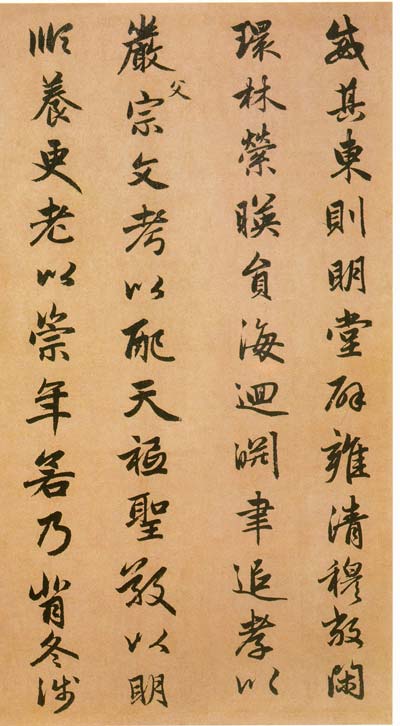
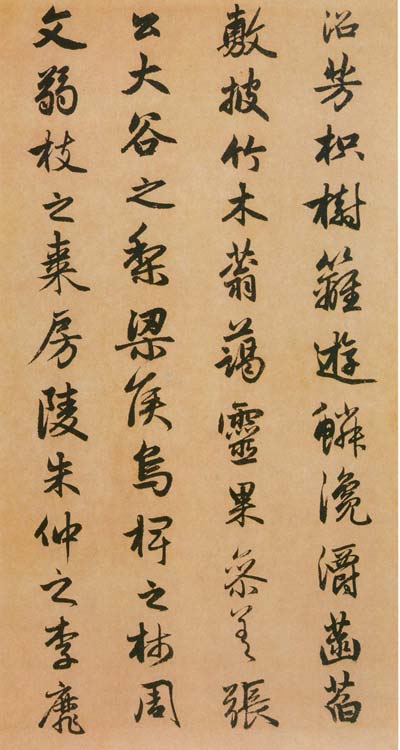
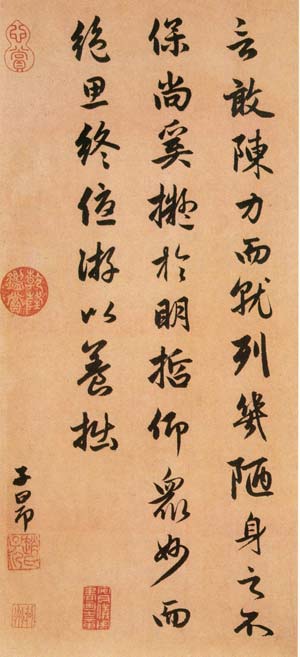
Appendix Pan Yue's original text of "Xianju Fu":
Travel to the long garden of graves and walk on the high thoroughfares of sages. Although my face is thick and thick, I still feel ashamed of Ning Zang. If I have the Tao, I will not be an official; if I have no Tao, I will not be a fool. What a lack of cleverness and wisdom, but more than enough clumsiness! So he retreated to live leisurely in Luo Zhixian. He is a well-off man, and his name is corporal. Back to Beijing and trace back to Yi, facing the suburbs and the market outlook. The Fuliang is dark and winding, and the Lingtai stands high. Peep into the secrets of astronomy and see the end and beginning of human affairs. To the west is the forbidden camp of Yuan Rong, with the green emblem of Xuanmu, giant millet in the stream, different feasts returning together, cannons, rocks and thunder, flying arrows and flying flies, who are the first to set off to show off the majesty of our emperor. To the east, there is a bright hall with a Yong, a clear and spacious mu, surrounded by forests, and a round sea with springs. Yu pursues filial piety to his father, pays homage to the emperor, worships the saints, and respects the old age. . If the winter is carried on one's back and the spring is carried, the yin is extinguished and the yang is used, and the emperor has something to do with Chai Liao, and uses the ancestors of the suburbs to show his righteousness, Zhang Juntian's Guangle, prepares thousands of horses, and serves Qi Xuan, pipes and chirps, and blows them together. Brilliant and faint, the ceremony and appearance are spectacular, and the royal system is also magnificent. The two schools are aligned, and the two buildings are as one, extending the country to the right, and embracing Liangyi to the left. Qi Qi gave birth to disciples, helped Confucianism, and was either promoted to a hall or entered a room. Teach the teacher of impermanence, the Tao is there. Therefore, when a fashionable scholar throws a veil, he is named Wang Huaixi. If his training is popular, it should be like grass. This is why benevolence is beautiful, and why Mencius’ mother moved three times.
I live in love, I build a house across the pond, the poplars reflect the marsh, the tangerine trees are fragrant, the scales are swimming, the lotus is spread, the bamboos and trees are luxuriant, and the spiritual fruits are varied. The pears from Dugu of Zhang Gong, the persimmons from Wuhu of Marquis of Liang, the jujubes from Zhou Wen's weak branches, and the plums from Zhu Zhong of Fangling are all planted inexhaustibly. The three peaches are different from the cherry blossoms, the second one is bright red and white, and the pomegranates and rose peaches are the treasures, spreading uprightly to its sides. Plum blossoms, apricots, and plum blossoms are the ornaments of prosperity and beauty, and their splendor shines brightly, beyond words. The dishes include onions, leeks, garlic and taro, green bamboo shoots and purple ginger, cordials are delicious, and polygonum is fragrant.
Then the cold autumn heat recedes, the cold spring goes away, the light rain becomes clear, and the world becomes clear and clear. Mrs. Tai is the imperial chariot. She ascends to the Qingxuan Pavilion and has a distant view of Wang Ji and her home. She uses walking to harmonize her body, distributes medicine through hard work, and adds regular food. Old illnesses are cured. So we had a long banquet, with willows hanging down in the shade, carriages on the track, picking purple houses on the ground, hanging carp on the water, feasting in the forest, or feasting on the river. Kundi is gray-grayed and has childish teeth. He calls him Wanshou and offers his cup of wine. He is frightened and happy at the same time. Holding a long-lasting wine glass, with a kind face, drinking happily from a floating cup, dancing with strings and bamboos, stamping one's feet, singing loudly against the music, living a happy life, who knows anything else. If you retreat from your own needs and reflect on yourself, your credit will be thin and your talent will be poor. In accordance with Zhou Ren's motto, if you dare to show your strength, you will be listed. I am so humble that my body cannot be protected, but I am like a wise man. I look up to all the wonderful things and have deep thoughts, and finally I am wandering around to support my clumsiness.

